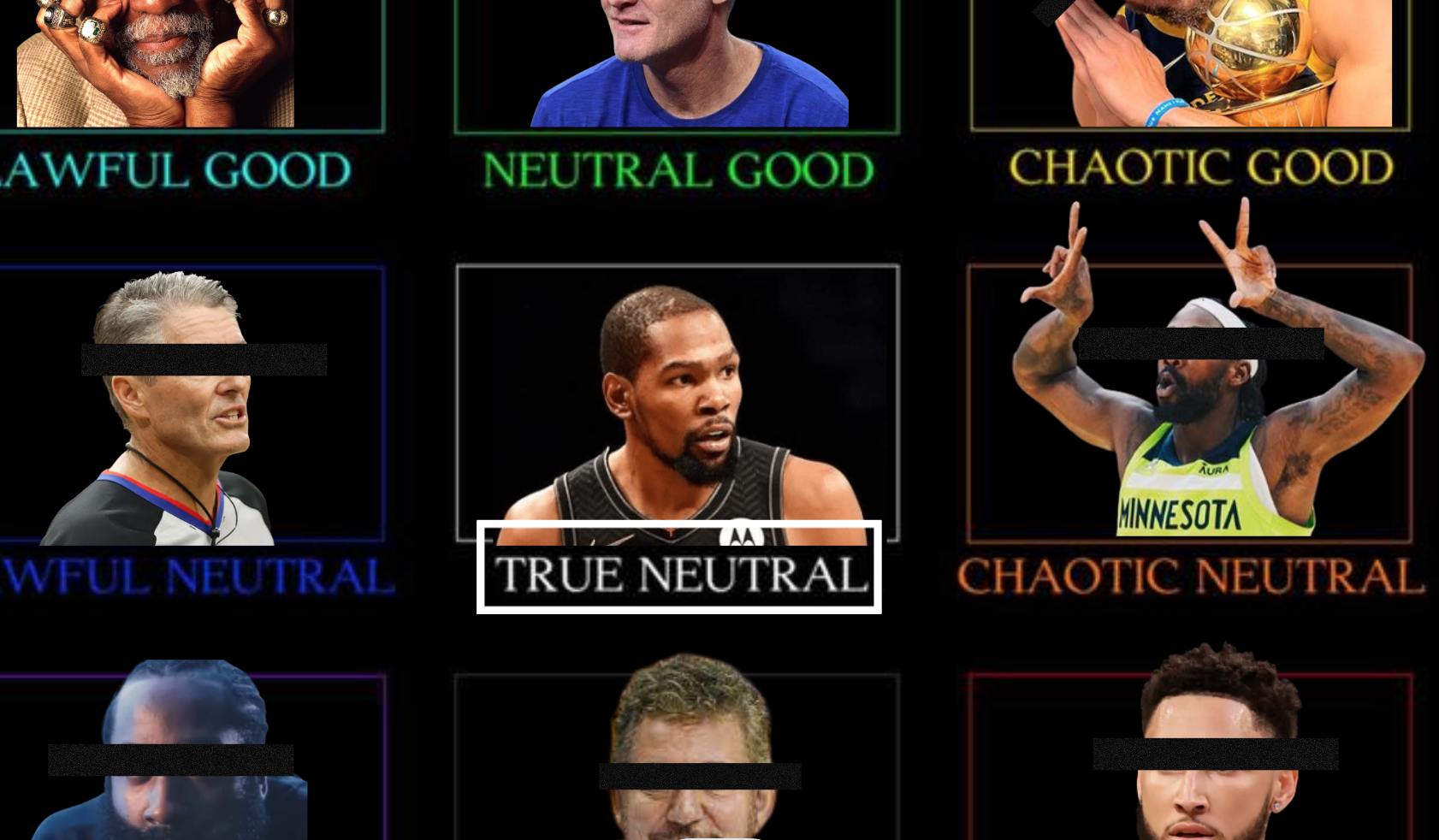
Active player with similar alignment: Kawhi Leonard
Former player with similar alignment: Lou Williams
How much, if anything, do NBA players owe a franchise?
In a climate shift that has given players more agency than ever, Kevin Durant represents the end of the spectrum that says, “Not a damn thing.”
Rating Durant’s selfishness is an interesting exercise. For one, he seems much less concerned about legacy talk than rival LeBron James, but he does share with him a desire for new challenges and great cities to live in. On the court, Durant is a communicative team player that almost never fails to produce high-level results in crucial moments. Considering his superstar status and the toxic fan expectations that come with it, his departures from teams have been disappointing, unceremonious, and bitter. Still, Durant’s body of work suggests he’s a nonchalant (albeit moody) guy who wants to enjoy his craft in peace rather than a cold-blooded mercenary.
***
As perhaps the most highly-touted 2nd overall draft pick ever, Kevin Durant humbly accepted the weight of a franchise on his shoulders. As part of a talented young core, Durant shared some of the weight as option 1A to Russell Westbrook’s 1B for nearly a decade in Seattle/Oklahoma City, becoming a robotically-efficient volume scorer that elevated his game and his team every year. Five years and three scoring titles later (four years into OKC’s existence), the Durant-led Thunder made it to the 2012 NBA Finals. After a crushing defeat to LeBron’s Miami Heat in which “Mr. Unreliable” led all players with 30.6 points a game shooting nearly 55 percent, Kevin Durant did what franchise players are expected to do: run it back.
The fourth time Durant ran it back with OKC in 2016, they were edged out by the 73-9 Warriors. Again, through no fault of the Thunder’s main man who dropped 30 a game in the series, including an effortless 27 in Game 7.
What more, if anything, did Kevin Durant owe the Oklahoma City Thunder?
As defined by My Kind of Meeple, a True Neutral character in Dungeons and Dragons is unbiased and pragmatic, ultimately ” … choosing the response which makes the most sense for them in each situation.” A True Neutral is not a rebel, but they don’t always care to follow the rules if it doesn’t suit them. Durant’s fateful decision to sign with the Warriors in the 2016 offseason culturally broke the NBA because he, a seemingly traditional knight in shining armor, became a soulless hooper-for-hire in the blink of an eye.
What makes the lanky living legend so controversial to this day is the disregard he has for long-held beliefs about player loyalty and responsibility to a franchise. He shat on these unwritten rules even harder this past offseason with his trade request and failed standoff with Brooklyn Nets ownership.
After breaking up with the Warriors for a number of quietly-said, loudly-heard reasons, KD, like any real True Neutral, stated “I just thought solely about me” at Nets Media Day in September 2020. Moving to Brooklyn wasn’t a move driven by spite, responsibility, or glory. He wanted to play with another certified hoops genius in Kyrie for fun. He wanted to play more iso ball. He wanted to make a lot of money and live in New York City.
– Kevin Durant to Kerith Burke of NBC Sports Bay Area
Simply put, the NBA is business to Kevin Durant. Such logical moves being made by a pro athlete aren’t dramatic at all when considered in isolation, but the NBA lends itself to the chaotic discourse of the streets in ways other pro sports leagues don’t. How the streets have received KD post-Thunder says a lot more about the culture than it does about Kevin.
Among the louder revelations:
- We’re still giving individuals credit (and blame) for group results
- Sport is theater for grown men
- You can’t be liked, respected, and a winner in today’s NBA — something has to give
Kevin Durant does things which demand opinions from invested NBA viewers. He’s done plenty off the court to suggest he’s petty and hard to please. He’s done plenty more to suggest he’s brilliant, honest, and healthily detached from results and unofficial “codes” at work. The trouble isn’t whether or not NBA viewers lean one way or the other about Durant. Discussions about his True Neutral tendencies are a problem because they’ve spawned wack beliefs like the idea of “fake” championships, the abuse of the term “superteam,” and expecting “real” superstars to drag mediocre teams to victory.
He’s caused quite the commotion over the last six years, but Kevin Durant seems to have embraced this phase of NBA fan culture. On Twitter he offers himself up to haters, trolls, and lovers of the game to provide insight, challenge the worst parts of fan culture, and sometimes join in on the hating and trolling. As messy as the conversation around him is, Durant is simple: ball is life, and he wants to live it at the highest level possible. No award, franchise, media or fan narrative is as important to him as the game.